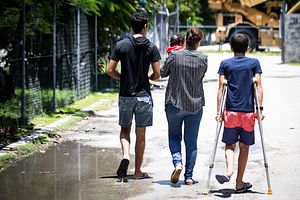Australia’s detention of refugees and asylum seekers in centers on Nauru and Papua New Guinea’s Manus Island is an intractable problem. Australia refuses to resettle anyone who has attempted to reach the country via maritime routes. Canberra has also refused New Zealand’s offer to resettle some of the detainees, arguing that this would encourage people smugglers to restart maritime crossings from Indonesia. In addition, Australia is using the detention center on Nauru as a way of propping up the country’s economy, which is dependent on Australian payments for use of the facility.
While the latter is a problem that currently has no clear solution, it remains deeply unfair that refugees and asylum seekers are permanently detained in order to sustain a country’s finances, and for Australia’s wider geostrategic calculations in preventing Nauru from failing, or allowing other states to prop it up. Despite this, an avenue toward a solution for at least some of the detainees has been discovered by a group of Australians living in Canada.
Canada has a unique program that allows private community groups to sponsor refugee resettlement. The program requires sponsors to commit to financing the resettlement of refugees for one year, and assist refugees with the practicalities of adjusting to their new surroundings. Since its inception in the late-1970s — when the Mennonite Church reached an agreement with the Canadian government to resettle Indo-Chinese refugees — it has become a highly successful program, with studies indicating that refugees resettled through the private sponsorship are able to more easily adjust to their new homes than those resettled through government programs.
The program is well-known in Canada and a considerable source of national pride. A group named Australia Diaspora Steps Up (Ads-Up Canada) have decided to start using the program to resettle refugees from Manus Island and Nauru in Canada. The Canadian government requires at least five people to form a community group to sponsor a refugee, and raise $12,500 to cover initial costs. Ads-Up Canada has already resettled two refugees from Manus Island, with a third due to arrive in Canada soon. The group states that they have submitted seven applications, with 10 more ready to be submitted.
Although this might be considered embarrassing to the Australian government, Australian diaspora groups working through Canada’s refugee sponsorship program offers a small avenue toward alleviating at least some of Australia’s problems. Australia’s policy of off-shore detention is expensive and it is reputationally damaging. People who have committed no crime are currently being held indefinitely in order to provide a disincentive to others who may consider attempting to reach Australia via maritime routes. It is a cruel and unusual policy, and one that a former official from the Department of Home Affairs has affirmed is unnecessary if Australia maintains a policy of using the navy to turn back boats leaving from Indonesia.
Australia’s two red lines — that people on Manus Island and Nauru will not be resettled in Australia, and that New Zealand will also not be able to resettle these people — require a work around. Canberra struck a deal with the Obama administration to resettle some refugees from the detention centers in the United States. So far 531 refugees have been resettled via this deal, however, in June the United States rejected a cohort of 300 further refugees, with Australia’s Minister of Home Affairs subsequently admitting that their target of 1,250 people being resettled in the United States was unlikely to be met. While the Canadian community sponsorship program may not be able to meet this number of refugees, for those the program is able to help it is a godsend. For Australia, any reduction in the number of people it currently detains is a step toward being able to close the detention centers.
The Canadian program also offers Australia an example of how it could restructure its own refugee resettlement program. In 2017, Australia launched a small community sponsorship program with a limit of 1,000 places. The 1,000 places, however, sit within the government’s refugee intake, unlike in Canada where the private sponsorship scheme is in addition to government programs. The Australian scheme is also expensive, at almost three times the cost of the Canadian program, and with the addition of a $13,000 application fee (Australia attempts to create a disincentive with almost all its visas through such considerable fees). It also requires refugees have functional English and either a job offer or the skills to be “job ready.”
These provisions set the bar too high to encourage the public to participate, and demonstrates that the government lacks trust in the Australian public’s ability to be able to facilitate the refugee resettlement and adjustment process. These provisions also hinder one of the Australian government’s other problems: encouraging people to settle in rural Australia, outside of the large coastal cities of Melbourne, Sydney, and Brisbane. Were the barriers to entry lower, Australia’s regional communities would be able to use the program to find the people they need to grow and become more sustainable. The success of Karen refugees from Myanmar in reviving the small Victorian town of Nhill presents a model for the Australian government to consider.
An expanded and accessible community refugee sponsorship program would also offer the opportunity for Australians to demonstrate their generosity of spirit and restore some national pride after the damage the years of off-shore detention has done to the nation’s soul. Australian diaspora groups in Canada can only do so much to help alleviate the problem of off-shore detention, as well as the mending of Australia’s reputation. At some point the Australian government itself is going to have to find measures that are able to enhance the national character, rather than continue to diminish it.

































